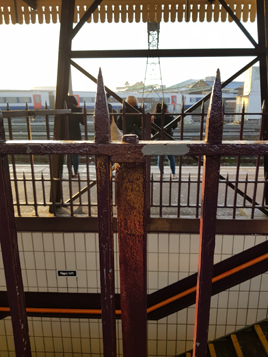Heads of security on the railways are calling up senior British Transport Police in cases of line closures due to suicide fatalities, asking for the line to be re-opened sooner, according to official inspectors. That’s part of a Her Majesty’s Inspectorate of Constabulary and Fire & Rescue Services (HMICFRS) inspection of British Transport Police’s work on minimising ‘disruptions’. They can arise due to vandalism, theft of cable from the track, suicides, and trespass. Any delay to services can mean that the rail operator is fined.
As the report says, fatalities and trespass are the two types of disruption that cause the most delay minutes and have the most risk attached to them for officers, rail workers and passengers trapped on delayed trains. Last year saw some 398 fatalities recorded on the network, compared with 352 the year before.
‘Delay minutes’ due to trespass and fatalities have increased over the past three years; from 78 minutes in 2017-18 to 100 last year on average per trespass incident and 1,773 minutes to 2,339 for fatalities; and likewise the average delay minutes for cable theft last year increased from 914 in 2017-18 to 1,183.
The report said: “Senior [BTP] officers told us they often feel pressurised by industry to get to incidents quickly, resolve the situation and return the network to normal. This pressure is often based on communication during or after incidents. We were told that it isn’t unusual during an incident for industry managing directors and security heads to phone senior officers, including the chief constable, to ask for a line to be opened faster. Frontline staff were largely protected from these political, commercial and financial pressures.”
Proposed in the report is that the BTP ‘should consider how it engages with the rail industry … and find better ways to work with them strategically’; ‘make available its training for police-related disruption, which is excellent, to more representatives from the rail industry and police officers from other forces’; and ‘review the way it shares information with the rail industry. It should explain some of its functions’ policies and procedures more. This will help the industry better understand BTP’s main functions, such as counter-terrorism and firearms’.
As set out in the report, franchise rail operators are more likely to engage with the BTP if it is financially worth it; but the inspectors found rail figures felt the BTP’s work on counter-terrorism, such as arming officers, especially at London main stations, was not ‘relevant’.
As background, disruption on the network affects the industry and passengers, operationally and financially. It has cost the industry £630m in the past five years, and it is expected to cost £750m more over the next five, according to the report. The BTP is Britain’s national police force for rail and the London Underground, though the Scottish Parliament has sought to bring BTP in Scotland into Police Scotland.
For the report in full visit the HMICFRS website.
Pictured by Mark Rowe; Clapham Junction platform, south London.









